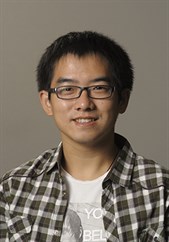
Dr. Atlas Wang, assistant professor in the Department of Computer Science and Engineering at Texas A&M University, was recently selected as a university challenge winner for the Lenovo AI Innovation Challenge, and was invited to give a presentation at the Supercomputing Conference (SC), held Nov 12-17 in Denver, Colorado.
The Lenovo AI Innovation Challenge was created to recognize the great and groundbreaking research in the fields of artificial intelligence and high-performance computing. Winners were selected from global top universities such as Yale University, Oxford and the University of Washington.
During the Lenovo Innovation Challenge, each university challenge winner gave a 45-minute presentation on their research related to artificial intelligence and high performance computing. Wang presented his research on “Exploiting Low-Quality Visual Data Using Deep Networks.”
While many sophisticated models are developed for visual information processing, very few pay attention to their usability in the presence of low-quality data. Most successful models are trained and evaluated on high-quality visual datasets. On the other hand, the data source often cannot be assured of sufficiently high quality in practical scenarios, with degradation factors abundant outside of the controlled research environment.
Wang’s research focuses on the robust sensing, processing and understanding of low-quality visual data using deep learning methods. His works are expected to generate broad impacts on real-world computer vision applications such as traffic monitoring, security surveillance and video communication.
Wang was also selected to present at the Computing Community Consortium (CCC) Oct 23-24 in Washington, D.C. The mission of CCC is to propel the computing research community and enable the pursuit of innovative, high-impact research. This year, 47 early-career faculty members and researchers across the United States from most fields of computer science are invited to present their research, and Wang is one of them. Wang introduced his robust computer vision works.